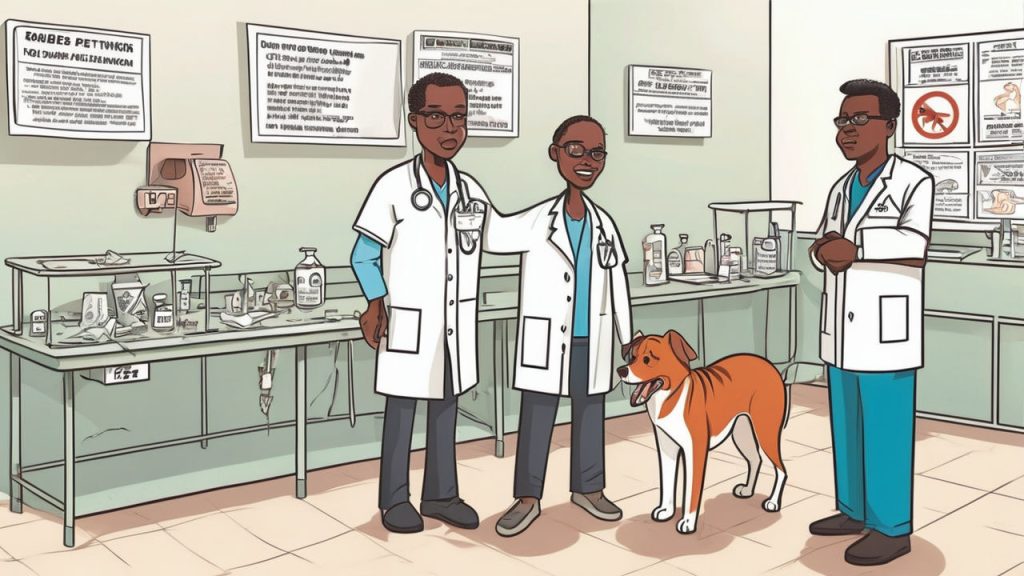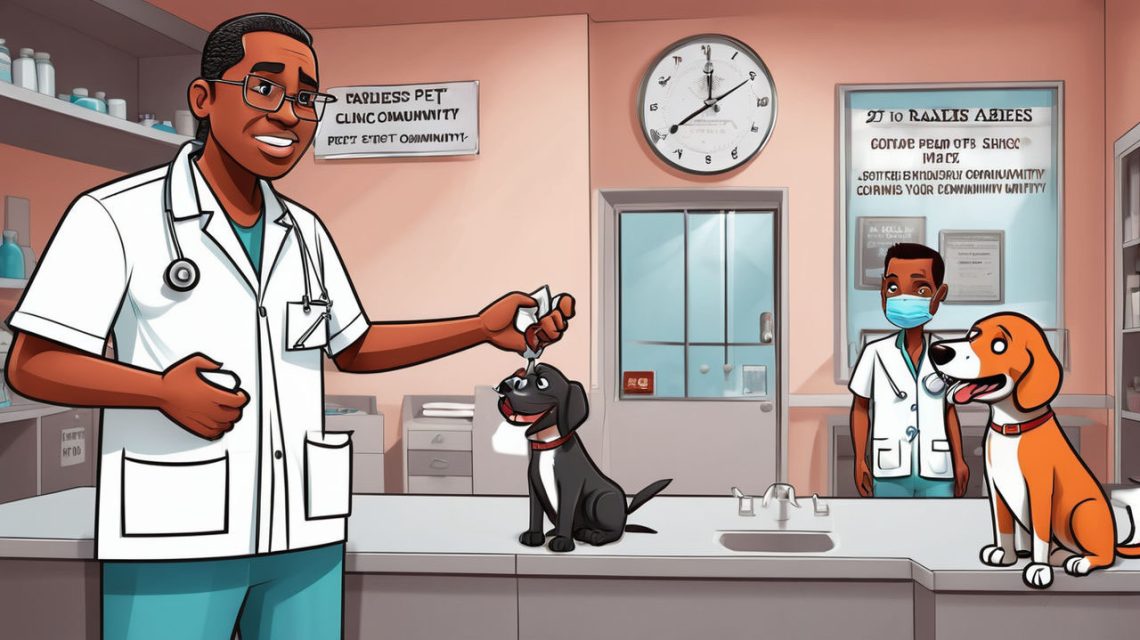Rabies Shot Clinics: Protect Your Pet and Community
Rabies is one of the most serious and deadly diseases that can affect both pets and humans. Fortunately, a simple rabies vaccination can keep your dog or cat safe and prevent the spread of this dangerous virus. Rabies shot clinics provide a convenient and affordable way to ensure your pet is vaccinated and protected. Whether you’re a new pet owner or simply looking for low-cost vaccination options, these clinics are essential for maintaining public health and your pet’s well-being.
In this article, we’ll explore the importance of rabies vaccinations, how rabies shot clinics work, and where to find affordable services for your pet.
Why Rabies Vaccinations Are Critical for Your Pet
Rabies is a viral infection that affects the nervous system of mammals. It’s transmitted through the bite or saliva of an infected animal, and once symptoms appear, rabies is almost always fatal. While the disease is rare in domesticated pets due to vaccination programs, it’s still a threat, especially in wildlife.
1. Rabies is Fatal, but Preventable
Once infected, rabies leads to symptoms like fever, aggression, paralysis, and ultimately death. However, the good news is that rabies is 100% preventable with the right vaccination. By keeping your pet up to date on their rabies shots, you’re not only protecting them but also helping to safeguard the wider community.
- Tip: Many local regulations require pets to have a current rabies vaccination, and failure to comply can result in fines or penalties.
2. Protecting the Public Health
Rabies is zoonotic, meaning it can be transmitted from animals to humans. Ensuring your pet is vaccinated helps reduce the risk of rabies spreading to other animals and humans. It’s an important step in protecting your family, neighbors, and the broader community.
What Happens at a Rabies Shot Clinic?
Rabies shot clinics provide a quick and affordable way to vaccinate your pet. These clinics are typically run by veterinarians or licensed veterinary technicians, offering a streamlined service to ensure as many pets as possible are protected. Here’s what to expect when you take your pet to a rabies shot clinic.
1. Quick, Safe Vaccination Process
When you arrive at the clinic, your pet will receive a quick physical exam to ensure they are healthy enough for the vaccine. Then, the rabies shot is administered, which takes just a few seconds. Most pets tolerate the shot well, and you’ll be on your way in no time.
- Tip: Bring your pet’s vaccination records to the clinic. If this is their first rabies shot, they will need a booster shot after one year, followed by boosters every one to three years, depending on local laws and your vet’s recommendation.
2. Documentation and Rabies Tags
After the shot, you’ll receive documentation proving that your pet has been vaccinated. Many clinics also provide a rabies tag for your pet’s collar, which shows they are protected and compliant with local laws. This documentation is important for registration purposes and may be required for boarding, grooming, or traveling with your pet.
3. Low-Cost and Convenient
Rabies shot clinics are often designed to be affordable and accessible. Many clinics offer vaccinations at a reduced rate, making it easier for pet owners to stay on top of their pet’s health without stretching their budget. These clinics may be held at local animal shelters, pet stores, or community centers.
- Tip: Some areas offer free rabies clinics during certain times of the year, particularly as part of community health initiatives. Check with your local animal control or humane society for details.

Where to Find Rabies Shot Clinics
Finding a rabies shot clinic near you is easy with a little research. Many local organizations and veterinary practices offer low-cost clinics throughout the year. Here are some options to help you locate a clinic for your pet.
1. Animal Shelters and Humane Societies
Local animal shelters and humane societies often host low-cost or free rabies vaccination clinics as part of their community outreach efforts. These events are designed to ensure that all pets, regardless of their owner’s financial situation, have access to this vital protection.
- Tip: Call your local shelter or visit their website to find out about upcoming rabies vaccination events. Many shelters also post announcements on their social media pages.
2. Veterinary Offices and Pet Stores
Many veterinary offices, pet hospitals, and even large pet supply stores like Petco or PetSmart hold rabies shot clinics. These clinics are often held on weekends to accommodate busy schedules and offer a more affordable option than a full vet visit.
3. Mobile Vaccination Clinics
Mobile veterinary services and pop-up clinics are becoming more popular, offering convenient care for pet owners who may not have easy access to traditional vet offices. These mobile units travel to different neighborhoods, setting up temporary clinics where you can get your pet vaccinated without the hassle of making an appointment.
How Often Should Your Pet Get a Rabies Shot?
Keeping your pet up to date on their rabies shots is important to ensure they stay protected throughout their life. The rabies vaccination schedule varies depending on your location and your pet’s vaccination history.
1. Initial Vaccination and Booster Shots
Puppies and kittens typically receive their first rabies shot at around 12 to 16 weeks of age. This is followed by a booster shot one year later. After that, the frequency of rabies vaccinations depends on your local laws and your vet’s recommendations. Most adult pets need a rabies shot every one to three years to maintain immunity.
- Tip: Ask your vet about the appropriate rabies shot schedule for your pet. Some areas require yearly shots, while others allow for a longer interval between boosters.
2. Keeping Records Updated
Make sure to keep your pet’s vaccination records in a safe place and update them after each rabies shot. In many regions, proof of vaccination is required to register your pet with the local government, and you may need this documentation for boarding, traveling, or pet insurance purposes.
The Benefits of Rabies Shot Clinics
Rabies shot clinics offer many advantages for pet owners, from cost savings to convenience. Here are some reasons why these clinics are an excellent choice for vaccinating your pet.
1. Affordable and Accessible
Rabies shot clinics are designed to be affordable, making it easy for pet owners to keep their pets vaccinated without breaking the bank. This is especially helpful for families with multiple pets or for those on a tight budget.
2. Fast and Convenient
These clinics often run on weekends or evenings, making it easy to fit a rabies vaccination into your busy schedule. You can usually walk in without an appointment, and the process is quick, allowing you to get back to your day with minimal disruption.
3. Community Health Protection
By vaccinating your pet at a rabies clinic, you’re not just protecting your dog or cat—you’re also helping prevent the spread of rabies in your community. Rabies vaccination programs have drastically reduced the number of rabies cases in domestic animals, and your participation helps keep these numbers low.
FAQs About Rabies Shot Clinics
Are rabies shot clinics safe for my pet?
- Yes, rabies shot clinics are run by licensed veterinarians or veterinary technicians who ensure your pet receives a safe and effective vaccination.
How much do rabies shots cost at a clinic?
- The cost of a rabies shot at a clinic can range from $10 to $25, depending on the clinic and location. Some community programs even offer free vaccinations.
What happens if my pet is overdue for their rabies shot?
- If your pet is overdue for their rabies shot, they may need to restart the vaccine series, beginning with a new initial shot followed by a booster. It’s important to keep vaccinations up to date to stay compliant with local laws.
Can my indoor-only pet skip the rabies shot?
- Even indoor pets should receive the rabies vaccine, as there is always a chance they could be exposed to wildlife, or an accidental escape could put them at risk. Most states also legally require it, regardless of indoor or outdoor status.
What should I bring to a rabies shot clinic?
- Bring your pet’s previous vaccination records, if available. It’s also helpful to bring your pet’s ID and a secure leash or carrier.


